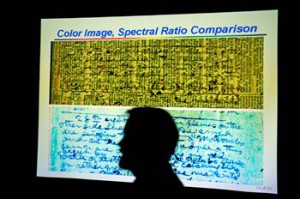
AN INTERNATIONAL team of scientists have recovered the lost text of Dr David Livingstone’s private diary.
The words in the historical diary have been missing for over 140 years, but according to experts, the recovery of the text may just change the way we think of one of Scotland’s most famous historical figures.
The Scots explorer famously ran out of ink and paper after witnessing the massacre of hundreds of slaves inAfrica.
He was forced to improvise and created ink made from berry seeds, using torn pages from books and old newspapers for paper.
As a result, the words faded with time, with history instead relying on a rewritten official account – until now.
A team of experts from around the world have used modern technology to recover the text, revealing more than just Dr Livingstone’s shock at the massacre.
Using a multi-spectral imaging technique to illuminate the pages and separate the layers of texts, they have gradually begun to recover the text.
Research assistant Kate Simpson, from Edinburgh’s Napier University, was the first person to read the words recovered from the “lost” diary.
It records Dr Livingstone gazing with “wonder” as three Arab slaves with guns entered the market in Nyangwe, a Congolese village, where 1500 people were gathered, mostly women.
“Fifty yards off, two guns were fired and a general flight took place- shot after shot followed on the terrified fugitives. Great numbers died. It was awful- terrible, a dreadful world this,” he wrote.
Remorse
However, Dr Adrian Wisnicki, who led the project, said there was evidence in the diary that suggested members of Dr Livingstone’s party might have been involved in the massacre.
And Dr Wisnicki, assistant professor at Indiana University of Pennsylvania and honorary research fellow at Birkbeck College, London, said: “Livingstone seems to have considered this possibility and this, together with his failure to intervene, appears to have left him with a profound sense of remorse.

“In copying over the 1871 diary into his journal, Livingstone decided to rewrite or remove a series of problematic passages. It’s taken 140 years to discover Livingstone’s original words.”
Dr Livingstone recounted the story to the journalist HM Stanley- famous for reportedly muttering the greeting “Dr Livingstone, I presume?”- whose report of the massacre forced the British government to close theEast Africaslave trade.
Details of the 18-month long project to uncover the lost writing were being revealed today at the National Library of Scotland, home to many of Dr Livingstone’s papers including parts of his African diaries.
The diary pages about the massacre came from the David Livingstone Centre in Blantyre, run by the National Trust forScotland.
A team of scholars and scientists from America and the UK used spectral imaging to recover the original text.
“Livingstone would never have published this private diary in his own lifetime,” said Dr Wisnicki.
“In particular, his attitude to the liberated slaves in his entourage is one of disgust- an attitude greatly at odds with his public persona as a dedicated abolitionist.”
Dr Wisnicki anticipates that the publication of the 1871 diary will change the way we look at Dr Livingstone.
“Instead of the saintly hero of Victorian mythology, the man who speaks directly to us from the pages of his private diary is passionate, vulnerable, and deeply conflicted about the violent events he witnesses, his culpability, and the best way to intervene- if at all.”

